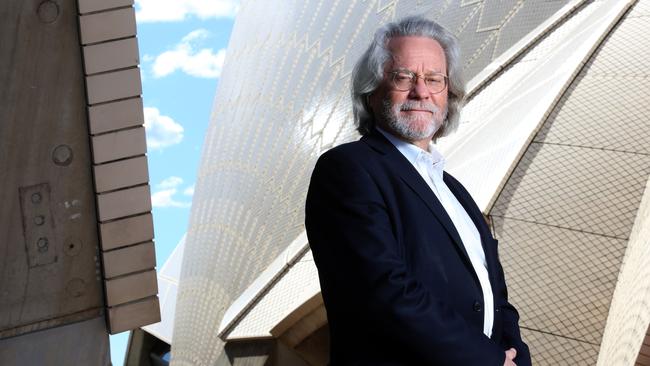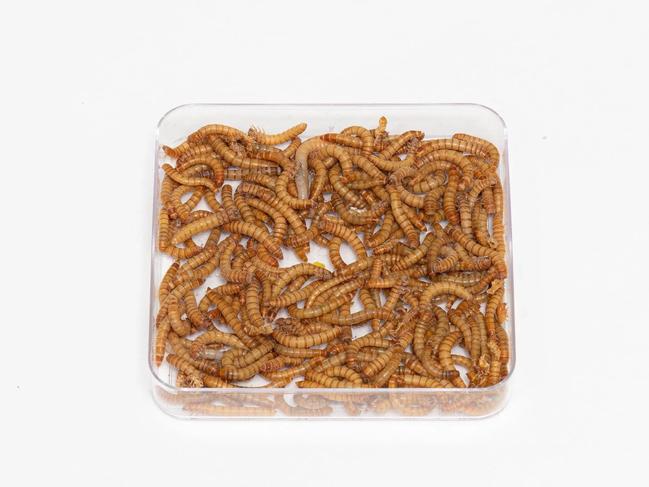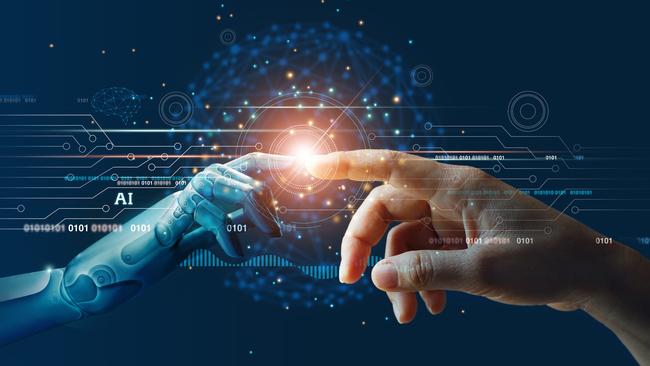Philosopher AC Grayling on why AI could be humankind’s ‘last invention’
Ahead of his Australian tour, renowned philosopher and author AC Grayling delives into a family murder that still haunts him, why we should eat mealworms and the dangers of AI.

AC Grayling is one of the world’s leading philosophers. The founder and professor of philosophy at London’s independent Northeastern University has also taught at London and Oxford universities. He has written more than 30 books including The God Argument, Democracy and its Crises and The Meaning of Things. In this edited interview, the celebrated British author, 74, warns that AI could make humans extinct and that the UK has “imploded” because of Brexit. He also holds forth on why gourmet mealworm burgers (mealworms are the larva of beetles and are commonly used to feed animals) could help to save the planet.
You are a prominent atheist. Why do you compare debates with people of faith to boxing tournaments?
Arguing against people of a theistic view is, as I just described in one of my books, like having a boxing match with an extremely large blob of jelly, because every time you land a punch it just simply absorbs it and blobs out somewhere else. Because they can always say, “Oh, that’s not what I mean by God’’. Or “God can’t be understood; he’s infinite”. There is no way you can get your hands on the argument. You cannot reason people out of views that they weren’t reasoned into.
Climate change is a pressing concern for you. You argue people should eat fewer hamburgers and more mealworm burgers. How have people responded to that culinary suggestion?
A lot of people say that we should produce less and consume less. That goes against the fact that in the last three decades or more, something like 1.5 billion people have been lifted out of absolute poverty.
If you lift people out of poverty then they are going to consume more. So we should not be thinking about reducing production and consumption, we should be thinking about more sustainable forms of production and consumption.

It is more sustainable to consume protein provided by mealworms. They are a delicacy in some communities. If you take the protein from them, they make very palatable hamburgers. I’d rather get the protein from that source than from the cattle for whom huge swathes of the Amazon rainforest are cut down. If we don’t do something about this, then we will end up on our hands and knees looking for real worms because we’ll all be starving (due to the effects of climate change).
On your forthcoming visit to Australia, you will explore the question: “Will AI be humankind’s ‘last invention’?” Do you believe artificial intelligence could make us extinct?
Artificial general intelligence is an intelligence like human intelligence, only massively greater. That could pose a threat because after all, such a system might ask itself: What is the most destructive and damaging thing on the planet? And of course, the answer is human beings. And it wouldn’t take long to decide what to do about it (laughs).
AI is already present in so many different aspects of our lives and has many positive possibilities, but it also has serious downsides. For example, the use of AI systems to undermine democracy, the use of AI and autonomous weapon systems. The rapidity of technological developments has been so great, that our ability to manage them and to think ethically about them has been outstripped.

As you point out, autonomous weapons can potentially be operated without human oversight. Does this pose a risk to people and indeed, entire nations?
Yes, it’s a very serious matter. And indeed, this is a very good example of a number of problems that we face in the AI connection. Hundreds of billions of dollars have been invested in the development of autonomous weapons guided by AI. This has been going for a long time without any discussion and very little public knowledge. And these systems are very probably already in operation in some spheres, and they will only increase.
Think of it; if you’re a government, like the Chinese or the American, able to invest in these systems to solve what’s called the body bag problem – so your own troops are not in harm’s way – you’re going to send these systems into battle more and more. And the people who will be on the frontline are, as usual, the innocents, the civilians. If they are nuclear armed, and they go wrong, and there’s no override or no human control of them, (these weapons) could cause devastating damage.
Your books have addressed questions ranging from the meaning of life, to the ethics of warfare and why flawed voting systems enabled Brexit and Donald Trump’s presidency. So you’ve been on a mission to demonstrate that philosophy is relevant to the big issues of our time?
Yes, very much so. Philosophical ideas and ways of thinking are extremely relevant. It’s a great pity that philosophy has been sequestered into one highly specialised corner of higher education, when it used to be much more generally available and accessed, at least among literate and thoughtful people.
Your sister Jennifer was murdered in Johannesburg when she was 27 and your mother died soon after from the shock. You were 19. How did that tragedy shape your life?
It had a profound effect in a couple of ways. For a very, very long time, I never used to talk about the fact that these things had happened.
In one way, one felt diffident about saying you carry around some kind of wound and expect people to be sorry for you. But then I realised that tragedy and sorrow, grief and loss is a very common factor in life and many people have burdens of grief and loss in their lives, far greater even than that.
When I think about people, for example, in war zones in Iraq, Afghanistan, Israel or Gaza – whole families wiped out. So eventually, I thought, given this is a commonplace experience, I will talk about it. I’m very glad that I have.
Do families ever get over the murder of a loved one?
I felt that it was as if something very serious and important and valuable had been dragged out of the world, stolen from the world, smashed out in the world by this horrible thing.
When you think about murder, the victim of the murderer may have had an absolutely horrible time being attacked or killed. But then that person’s suffering is over and all the family, all the relatives, all the friends, all the people who loved that person, have now got a life sentence of sorrow and horror, which is why murder is such a dastardly thing.
You had an awakening after your sister’s horribly violent death. What was it?
It made me feel that because this kind of bad thing had happened that one’s response should be to try to put back into the world more that is of some use or some contribution. If something bad is happening, if there are 10 degrees of badness, then you should put 11, 12 or 20, or 100 degrees of goodness back into the world somehow to compensate for it.
Your brother John is a retired brewer who lives in Australia and he often tours with you when you visit here ...
Yes, it’s always an opportunity for us to spend time together.
We’re very close.
He is the person who, by far, I am closest to.
In your 2013 book The God Argument, you called religion “a hangover from the infancy of modern humanity”? Was there a lot of pushback against that assertion?
Yes – after all, there is quite a bad-tempered argument sometimes between the theists and people whom I count and counted as friends and colleagues in this debate – people like Richard Dawkins and Christopher Hitchens, who have been even more bluntly spoken than I have. Somebody once described me as the velvet atheist. The reason that most people continue to adhere to a religious outlook is because they were brought up to it.
My concern – and it was a concern of Hitchens’, as well – is the harm that religion does. One looks around the world and the long roots of religious differences have produced cultural and political differences of a very savage and tragic kind – in the Middle East, the Balkans, Northern Ireland, everywhere really.
But what about the charitable and social justice work religious orders carry out?
We can see the harm religion does alongside the good that it does, which is charitable work, and it has inspired art and so on. But then non-religious people have done charitable work and inspired art, so there’s nothing special in that.
Your 2006 book, Among the Dead Cities, argued that the Allies’ area bombing of Germany during World War II was a crime. What do you think of Israel’s intense bombardment of Gaza, and Hamas’s murder of Israeli civilians?
In all these cases there is tremendous concern that it is the innocents – the elderly and young children and the young – who are put on the frontline and who are targeted. My argument in Among the Dead Cities was that the Allied powers did indeed have a moral duty to defeat Nazism. Nazism was a force of evil. But when you look at the fact that a choice was made to indiscriminately bomb civilian populations, we really have to put our hands on our hearts and say, “We really did something wrong there’’.
The principle that applied there applies everywhere. It applies in Israel and Gaza today. It is an atrocity to target civilians and on both sides of this argument, those atrocities are being committed.
You have spoken about how gene editing allows for Brave New World style creation of foetuses who are good-looking and athletic or fearless on the battlefield. Should we be worried?
Yes, we should be seriously worried. In my (recently published) book, For The Good of the World, I set out a dangerous law; I call it Grayling’s Law. And it says anything that can be done will be done, if it brings advantage to whoever can get it done. So gene editing will happen. There are countries who want to edit fearless soldiers – this is something which is alleged about China by the Americans. The people who have the money and the opportunity will do it (produce genetically enhanced humans) unless we can find ways of agreeing how to manage this.
You campaigned against Brexit. How do you feel your homeland’s divorce with Europe has played out?
I am terribly, deeply disappointed at the dreadful effect that it’s had on the United Kingdom. The United Kingdom has, to all intents and purposes, imploded as a result of Brexit.
You were involved with the Remain campaign. Why are you campaigning to have Brexit reversed?
We are still determined to reverse it as a way of rescuing our country from a historically bad mistake. It’s not sustainable. It is impacting the UK economy to the tune of over $100 billion a year.
We saw just yesterday, the (Sunak) Government raising the caps on bankers’ bonuses on the same day that the Joseph Rowntree Foundation published a report which says three and a half million people in the United Kingdom live in poverty.
It is quite shaming now to think of how rapidly and badly we’ve declined as a result of that very bad mistake (Brexit). This is one reason why I spend as much time as I can in Paris, because I just find it unpleasant to witness the way that the country has been.
You sound pessimistic about the future yet consider yourself an optimist ...
I’m a person of naturally optimistic temperament on the basis that there’s no alternative; if you weren’t optimistic, you would just simply throw yourself out of a very high window and get it over with (laughs). In practical terms we’re kind of stuck with being as optimistic as we can be.
AC Grayling will speak at Perth’s WA Museum on November 15 and at the Queensland Performing Arts Centre on November 27 and 28.





To join the conversation, please log in. Don't have an account? Register
Join the conversation, you are commenting as Logout